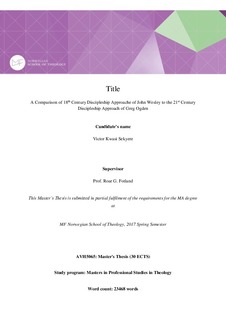A Comparison of 18th Century Discipleship Approach[e] of John Wesley to the 21st Century Discipleship Approach of Greg Ogden
Master thesis
Permanent lenke
http://hdl.handle.net/11250/2458449Utgivelsesdato
2017Metadata
Vis full innførselSamlinger
Sammendrag
Jesus commanded the Church in Matthew 28 to go and make disciples of all nations. However, Jesus discipled 12 of his followers and they became transformed and empowered, such that through them, Christianity spread in the world. I believe many churches seek to obey Jesus’ command above by engaging in many different discipleship approaches. John Wesley therefore, tried to obey this command by undertaking a discipleship approach that resulted into the spread of scriptural holiness in the 18th century Britain and beyond. Thus, the creation of Methodist churches in almost every part of the world today. In view of the above, the United Methodist Church states “the mission of the church is to make disciples of Jesus Christ for the transformation of the world.”1 However, one wonders how discipleship is done today. In light of this, this thesis seeks to compare the 18th century discipleship approach of John Wesley to the 21st century discipleship approach of Greg Ogden. The study is a qualitative research, which deals with literature studies. Hermeneutic theory of interpretations was employed to understand and interpret the historical discipleship of Wesley and the contemporary discipleship approach of Ogden. The study was guided by the following sub-questions what is John Wesley’s theology of discipleship? What is Greg Ogden’s theology of discipleship? What is John Wesley’s discipleship approach? What is Greg Ogden’s discipleship approach? The study, therefore, established that John Wesley used 3-level small groups of society meeting, band meeting and class meeting as his main discipleship approach. And Ogden created a practical guide, book called Discipleship Essentials: A Guide to Building Your Life in Christ as his main discipleship approach. However, the study further established that though both Wesley and Ogden used small groups as their main discipleship approaches, Wesley’s approach offers a greater opportunity for the transformation and empowerment of the disciple into becoming a change maker.
